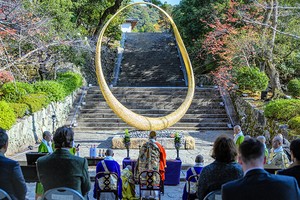THE ASAHI SHIMBUN
March 13, 2023 at 19:00 JST
Kenzaburo Oe, the Nobel prize-winning author who warned against the dangers of nuclear power and became known as a standard bearer of postwar literature, died of natural causes in the early hours of March 3.
He was 88.
His family has already held a funeral for him.
Known as a towering literary giant and prominent social activist, Oe tackled political, social and philosophical questions of his time, and his works frequently pursued the themes of resurrection and salvation.
Oe was born in 1935 in Ose village in Ehime Prefecture, now the Ose district in the town of Uchiko in the prefecture.
In 1957, when he was still a student at the French literature department of the University of Tokyo, his short novel “Kimyo na Shigoto” (The Strange Work), won high praise and the university newspaper’s May Festival Prize.
That led him to publish the short story “Shisha no ogori” (Lavish are the Dead) in a literature magazine that year.
He drew attention as a writer of the new generation and won the prestigious Akutagawa Prize for “Shiiku” (The Catch) in 1958.
The novel is set in a village in Japan during war, where an enemy solider is imprisoned.
Oe started the serial essay “Hiroshima noto” (Hiroshima Note) for the Sekai magazine in 1964, based on interviews and information he gathered in Hiroshima, which was devastated by the atomic bomb in World War II.
He made public his anti-nuclear and anti-war views and beliefs throughout his career.
He published “Okinawa noto” (Okinawa Note) in 1970, which traced the lives of residents and the history of the islands.
He became the second Japanese person to receive the Nobel Prize in Literature in 1994 and was named to receive the Order of Culture but declined it the same year.
“It’s an award connected to the state,” he explained.
In 2004, he and other notables like critic Shuichi Kato and playwright Hisashi Inoue founded the “Article 9 Association,” aimed at protecting the Constitution from being stripped of its war-renouncing provision.
After the 2011 Great East Japan Earthquake, Oe rallied at protests and joined gatherings opposing nuclear power plants.
He won a host of literary awards throughout his life, including: the Tanizaki Prize for “Manen Gannen no Futtoboru” (The Silent Cry) in 1967, the Noma Prize for “Kozui wa Waga Tamashii ni Oyobi” (The Flood Invades My Spirit) in 1973, and the Jiro Osaragi Prize for “Atarashii Hito yo, Mezameyo” (Rouse Up, O Young Men of the New Age!) in 1983.
He won the Asahi Prize in 1994, after contributing commentary pieces on literature and current events for The Asahi Shimbun from 1992 to 1994, along with the serials “Teigi Shu” and “Tsutaeru Kotoba.”
His last novel was “Bannen Yoshikishu” (In Late Style) published in 2013.
The massive, 15-volume extant works of Oe, titled “Complete Novels of Kenzaburo Oe,” was published in 2018 and 2019.
He donated some 50 of his belongings, including more than 10,000 pages of his handwritten manuscripts, to the University of Tokyo in 2021. It is said to be one of the largest handwritten draft collections for one novelist.




















A peek through the music industry’s curtain at the producers who harnessed social media to help their idols go global.
A series based on diplomatic documents declassified by Japan’s Foreign Ministry
Here is a collection of first-hand accounts by “hibakusha” atomic bomb survivors.
Cooking experts, chefs and others involved in the field of food introduce their special recipes intertwined with their paths in life.
A series about Japanese-Americans and their memories of World War II